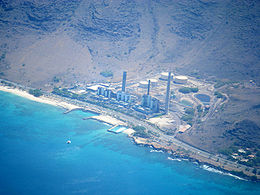- Hawaiian Electric Industries
-
 HECO power plant at Kahe Point in West Oahu
HECO power plant at Kahe Point in West Oahu
Hawaiian Electric Industries Inc.. (HEI; NYSE: HE) is the largest supplier of electricity in the state of Hawaii, suppling power to 95% of Hawaii's population through its electric utilities: Hawaiian Electric Company, Inc., Hawaii Electric Light Company, Inc. and Maui Electric Company, Limited. In addition, HEI owns a financial institution serving Hawaii, American Savings Bank.[1] (The island of Kauai is the only island in the state not supplied by HEI. Instead, the consumer-owned Kauai Island Utility Cooperative manages the island's electricity.)
HECO, HELCO, and MECO employ more than 2,000 people. Approximately 20,000 Hawaii residents are shareholders of HECO’s parent company, Hawaiian Electric Industries (HEI).[2] The company is headquartered in Honolulu.
Contents
History
Hawaiian Electric Company (often abbreviated HECO, pronounced HEE-coh) incorporated on October 13, 1891.[3] Within about 16 years the utility had 2,500 customers on the island of Oahu. By 1914 HECO had started rural service to the windward side of the island and was marketing electric products like refrigerators and flat irons. By 1937 HECO broke ground on its second power plant, and transmission lines soon crisscrossed Oahu.[4]
War and Statehood
During WWII HECO power plants, now linked to busy military bases, generated more than one million kilowatt hours of electricity each day.
Hawaii became a state in 1959, and by then the entire island of Oahu was electrified. Massive power plants, some still in operation today, came online. HECO flipped the switch on a 116,000-KW plant in downtown Honolulu in 1954. And the state's first reheat steam turbine generator went on line at Kahe on the west coast of Oahu. Today, Kahe is the state's largest plant with a total generating capacity of 650,000-KW.
Island Expansion
HECO purchased Maui Electric Company (abbreviated MECO and pronounced ME-coh) in 1968. In 1970 HECO also acquired the Big Island's Hilo Electric Light Company (later to be renamed Hawaii Electric Light Company, abbreviated HELCO and pronounced HELL-coh). MECO had expansion plans of its own. In 1988, it acquired the Lanai City power plant on the island of Lanai, and in 1989, Molokai Electric Company on the island of Molokai.
Generation
Oahu: total firm generating capability is 1,817 megawatts for 295,282 customers.[2]
HECO Owned Plants (oil) Megawatts Honolulu 1543 Waiau 499 Kahe 651 CIP 120 Independent power producers Megawatts H-POWER (waste-to-energy) 46 Kalaeloa Partners, L.P. (oil) 208 AES-Hawaii (coal) 180 Maui: total firm generating capability is 290.1 megawatts for 67,489 customers.
MECO Owned Plants (oil) Megawatts Maalaea 212.1 Kahului 37.6 Lanai 10.4 Molokai 12.01 Hana (Dispersed generation) 2.0 Independent power producers Megawatts HC&S (hydro, bagasse, coal, recycled oil, oil) 16 Maui Non-firm Generation (as-available) Megawatts Kaheawa Wind Farm 30 Makila Hydro .5 Lanai Sustainability Research (PV) 1.2 Big Island: total firm generating capability 291.9 megawatts for 79,813 customers.
HELCO power plants (oil) Megawatts Hill 35.5 Puna 36.5 Keahole 80.6 Kanoelehua 21.8 Shipman 15.2 Waimea 8.3 Dispersed generation 4.0 Independent power producers Megawatts Puna Geothermal Venture 30 Hamakua Energy Partners (naphtha) 60 Non-firm generation (as-available) Megawatts HELCO’s Lalamilo wind farm 2.3 HELCO’s Puueo & Waiau units (hydro) 4.35 Apollo Energy Corp.(wind) 20.5 Wailuku River Hydroelectric 12.1 Hawi Renewable Development (wind) 10.56 Keahole Solar Power (concentrated solar power) .5 Other small producers (wind, hydro, oil) <1 Electric vehicles
Through a cooperative effort with HECO, High Technology Development Corporation (HTDC), an agency of the State of Hawai’i, initiated the Hawai’i Electric Vehicle Demonstration Project (HEVDP) consortium to develop an electric vehicle industry in Hawai’i. [5]
References
- ^ HECO > About Us
- ^ a b HECO Power Facts
- ^ Birth Of HECO
- ^ Electrifying Oahu
- ^ High Technology Development Corporation > About Us
External links

This article about a United States company or corporation involved in the energy industry is a stub. You can help Wikipedia by expanding it.
